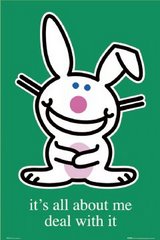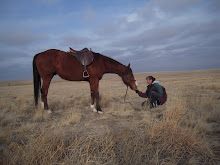Some people believe that ingesting certain substances (i.e., wine, beer, pot, whatever it is that floats your boat) really brings out their creative genius and enhances their performance. This is not true. However, I have found (and have heard fellow academic-types agree) that sipping on a glass of wine, or a fine dark beer (my advisor recommends Guinness or something similar) really can aid your writing. It relaxes your inhibitions just enough to really get the words flowing, without totally incapacitating you. May not be your finest writing, but you're gonna' go back and edit, anyway, and at least then you have something to edit instead of having nothing--or that single sentence on which you have spent the last half-hour trying to make it "perfect."
And now I am going to top off my glass and get back to that paper...
Thursday, March 1, 2012
Saturday, February 25, 2012
Things I've Learning in Grad School #3
Being humble, helpful, and generally nice does not mean you have to allow people to walk all over you.
Monday, February 13, 2012
Things I've Learned in Grad School #2
When in doubt, go with "it depends"--a pretty reliable answer to almost any question. Granted, you might have to be prepared to next discuss on what "it" depends--but if nothing else, it'll buy you some time :)
Tuesday, February 7, 2012
Things I've learned in Grad School: #1
New weekly post idea: things I've learned during this grad school/doc program thing--and mostly those things I've learned OUTSIDE of the classroom (with a few exceptions, I'm sure), but still directly related to my enrollment in the program.
The very first lesson learned in grad school: Grad school can make you doubt your ability to get along in the real world. Then again, one must remember that grad school is a far cry from the real world.
The very first lesson learned in grad school: Grad school can make you doubt your ability to get along in the real world. Then again, one must remember that grad school is a far cry from the real world.
And yet another new dissertation idea...
Qualitative study--interviews with teachers working at Durango High School as they prepare to launch the new learning-communities model in August 2012.
Freshman and sophomore students at Durango will select one of three learning communities within the larger high school to commit themselves for the first two years of their high school experience (during Junior and Senior years, it sounds like they will still "belong" to their learning community, but be free to take a wider range of electives). The three learning communities: (1) the DaVinci school of creativity and innovation; (2) the Atlas international school of inquiry; and (3) the Basecamp school of expeditionary learning. Apparently, this model was actually formulated and proposed by the teachers at the school, and they are currently participating in additional professional development to prepare for this change in the upcoming school year. As I said above, I want to interview the teachers about the process--the development of the idea and proposals from teachers' perspectives, their process in selecting a community of which to be a part, anticipated challenges and opportunities, the professional development opportunities (and if teachers find them to be sufficient, or if there is additional support they feel they would like), etc.
Haven't even started reviewing the literature, yet, so this is a very early-stage idea, but doable (as long as the school district and teachers will have me!)
Freshman and sophomore students at Durango will select one of three learning communities within the larger high school to commit themselves for the first two years of their high school experience (during Junior and Senior years, it sounds like they will still "belong" to their learning community, but be free to take a wider range of electives). The three learning communities: (1) the DaVinci school of creativity and innovation; (2) the Atlas international school of inquiry; and (3) the Basecamp school of expeditionary learning. Apparently, this model was actually formulated and proposed by the teachers at the school, and they are currently participating in additional professional development to prepare for this change in the upcoming school year. As I said above, I want to interview the teachers about the process--the development of the idea and proposals from teachers' perspectives, their process in selecting a community of which to be a part, anticipated challenges and opportunities, the professional development opportunities (and if teachers find them to be sufficient, or if there is additional support they feel they would like), etc.
Haven't even started reviewing the literature, yet, so this is a very early-stage idea, but doable (as long as the school district and teachers will have me!)
Subscribe to:
Comments (Atom)

